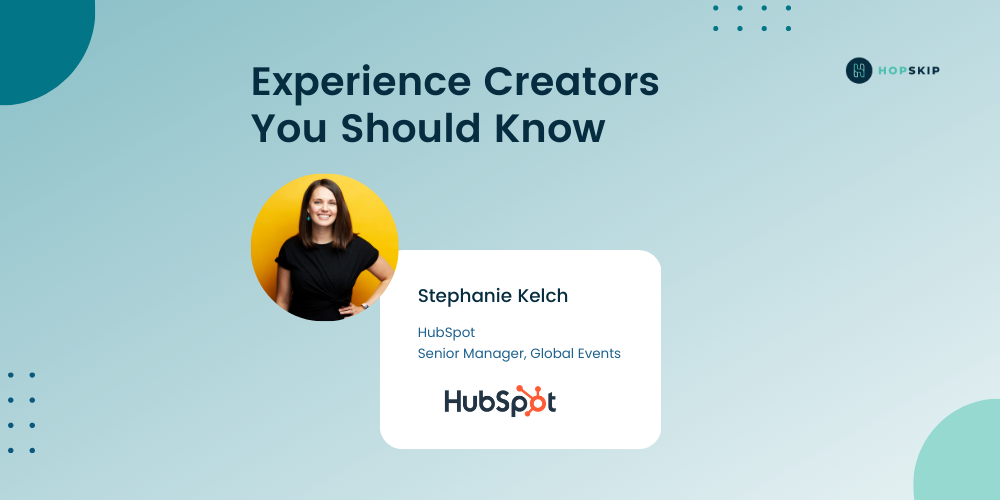Experience Creators You Should Know - Stephanie Kelch, HubSpot
Stephanie Kelch, of HubSpot, discusses how she honed her skills over the pandemic to now be in position to overcome the challenges that the new meetings/events landscape brings.
Luke Whalin
Apr 19, 2023

This post is part of the HopSkip Planner Spotlight Series where HopSkip spotlights planners across the industry to bring awareness of how they adapted to COVID-19, communicating and lessons learned and sharing how they are viewing the meetings and events industry in a post-pandemic world.
Name: Stephanie Kelch
Company Name: HubSpot
Job Title: Senior Manager, Global Events
Years of Experience: 13
How did you get your start in the events industry? What made you pursue this role?
I never planned to work in events, but I should have always known it’s where I’d end up. I love the energy you get when bringing a room full of people together, paired with an innate need to make sure everything is organized and buttoned up - it’s the perfect fit for me, and I love what I do. My first official taste of planning came from being the coordinator on my university sailing team. We traveled all over the country, sleeping on couches, trailering boats hundreds of miles in a weekend, and sailing come rain or shine. It was no easy feat to organize 25 college sailors, so I thought to myself, how different could it be to do this for a living? Turns out, pretty different. But the fundamentals are the same, and the journey has evolved for me each step of the way. Sailing gave me the idea, but my first role at an event agency right out of college cemented the deal, and I’ve never looked back.
How would you describe your role or responsibilities as a professional event planner?
At HubSpot, I lead the Global Events Physical Production team. I focus on producing INBOUND (4 days with 10,000 in-person sales and marketers + 40,000 virtual) and various other events depending on the year. I oversee the end-to-end planning from strategy to execution for our experiential design, fabrication, production, logistics, and operations. I have a great team of event creators and agency partners who help make the magic happen.
How do you compare planning your first in-person event post-pandemic, to planning meetings/events pre- Covid? What was different and unique? What was similar?
Emerging from the pandemic, we faced all the issues you’ve probably already heard about - tight planning timelines, supply chain challenges, labor shortages, increased costs, etc. But if I take a step out of the logistics, one of the biggest fundamental shifts I’ve seen is the priority of why people attend an event. Over the last few years, a majority of events were canceled or flipped on their side and reimagined as virtual. There was a lot of value in that, and people could still learn from the content; it was often cheaper to attend and allowed companies to reach a much wider and more global audience. But the number one thing people felt couldn’t be replicated well in a digital-only environment was the sense of connection and community and the energy that comes from being in person. We termed it “the crisis of disconnection” and centered our planning around that fundamental idea. So while networking has always been a component of events and a reason why people attend, community building and engagement is now at the core and influence our overall strategy and all of our planning.
Are there any key lessons or insights that have shaped your approach to event planning over the years?
Many people who work in events (myself included), like to have a plan and follow that plan. But if I’ve learned one thing, it’s the value of being adaptable and the ability to manage through ambiguity. Things change - business priorities, budgets, people, and as we all now know too well the world changes. I’ve noticed this specifically working on large-scale events with year or 16mo long planning cycles, but the lesson is applicable for any type of event. As for tips, shoot your shot! Haven’t you worked in tech? Great. Don’t have specific corporate event experience? No problem. We are always looking for people from different industries, experiences, and backgrounds. There is so much we can learn from each other that diversity helps us all move forward as individuals and an industry.
Set expectations up front, both internally with key stakeholders and with your hotel contacts. There were so many cancellations during COVID that events are back with a vengeance, so finding your preferred dates and space can be really challenging. And once you find it, you have to move quickly to secure it. Aligning up front on what’s needed and where you can flex vs. not is key to ensuring you get the space you need.
Are you approaching contracting with hotels differently, post-pandemic?
I am definitely a little shyer about signing large multi-year deals with strict cancellation terms - the future has always been hard to predict, but now the potential need to pivot is greater than before the pandemic. I also know it goes both ways, so open communication and partnership is a huge piece in negotiating terms.
Aligning with the priority around building a sense of connection and community at events, one of the best innovations we brought to our event last year was a networking tool that allowed attendees to connect easily by clicking their name badges together. Contact sharing was at your fingertips and integrated into our mobile app - it was a game changer for our experience.